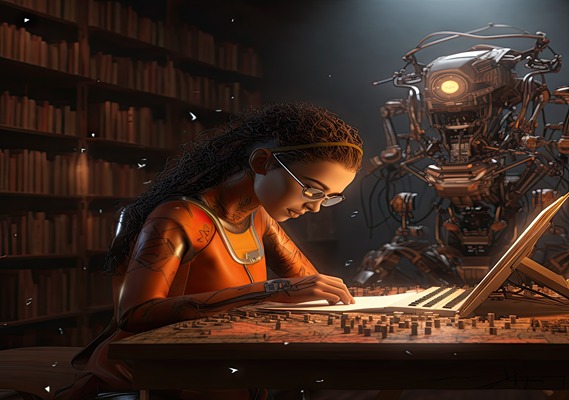AI is a transformative technology holds promise to address longstanding challenges in education while opening up new avenues for creativity and engagement in learning.
At its core, AI in education aims to enhance the learning experience by adapting to individual student needs. Traditional classrooms often struggle with the diverse pace at which students grasp concepts. Some students may require more time and practice, while others grasp concepts quickly and need more advanced material. AI can tailor learning experiences to each student’s pace and style, offering personalized tutoring and adaptive assessments. This personalized approach not only improves learning outcomes but also boosts student confidence and motivation.
One of the most significant impacts of AI in education is its ability to analyze vast amounts of data to identify patterns and insights. By tracking student progress and performance, AI algorithms can provide educators with actionable insights into each student’s strengths, weaknesses, and learning patterns. Moreover, AI can help identify trends at the institutional level, enabling administrators to make informed decisions about curriculum design, resource allocation, and policy development.
AI-powered tools are also transforming the role of educators. Rather than replacing teachers, AI serves as a valuable assistant, automating routine tasks such as grading assignments and generating progress reports. This automation frees up educators to focus more on personalized instruction, mentoring, and fostering critical thinking skills in students. By offloading administrative burdens, AI empowers educators to spend more time on what truly matters: inspiring and guiding students on their educational journey.
Furthermore, AI facilitates inclusive education by providing accessible learning materials for students with disabilities or learning differences. Text-to-speech technology, for example, can help visually impaired students access written content, while speech recognition software supports students with dyslexia in developing their reading and writing skills. These AI-driven tools ensure that all students, regardless of their abilities, have equal access to quality education.
Online platforms powered by AI offer personalized courses and recommendations based on individual career goals and learning preferences. Professionals can upskill or reskill themselves with targeted training modules that adapt to their evolving needs, keeping pace with rapid technological advancements and industry requirements.
However, the integration of AI in education is not without challenges and ethical considerations. Privacy concerns arise from the collection and use of student data, requiring stringent safeguards to protect sensitive information. There is also a risk of perpetuating inequalities if AI systems are not designed with diversity and inclusivity in mind, potentially widening existing educational disparities.
Ethical dilemmas surrounding AI also extend to issues of accountability and transparency. As AI systems become more autonomous in decision-making processes, questions arise about who is responsible for errors or biases that may occur. Educators and policymakers must establish clear guidelines and ethical frameworks to ensure that AI in education is used responsibly and ethically, prioritizing the well-being and rights of students.
Teachers must understand how to interpret AI-generated insights, leverage AI tools to enhance learning experiences, and support students in developing digital literacy skills essential for navigating an AI-driven world.
Looking ahead, the future of AI in education holds immense potential for innovation and collaboration. As AI technologies continue to evolve, so too will their applications in education, creating opportunities for interdisciplinary research and partnerships between educators, technologists, and policymakers. By harnessing the power of AI responsibly and inclusively, we can create a future where every learner has access to personalized, equitable, and high-quality education.
In conclusion, AI is not merely a tool but a transformative force in education, enhancing learning experiences, empowering educators, and fostering a culture of lifelong learning. By embracing AI technologies thoughtfully and ethically, we can unlock new possibilities for education and equip students with the knowledge and skills they need to thrive in the 21st century and beyond. As we navigate the complexities and opportunities presented by AI, let us remain vigilant in safeguarding educational values while harnessing AI’s full potential to create a brighter future for learners worldwide.




